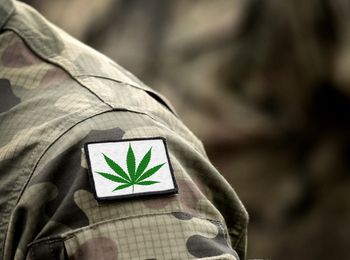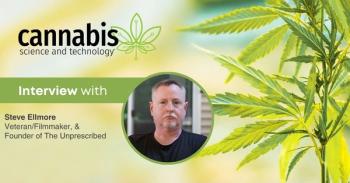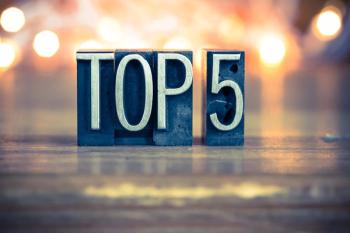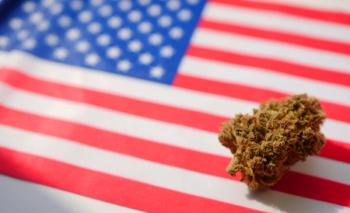
From Warzone to Wellness: How Medical Cannabis Is Helping Veterans Find Healing and Community
After serving their country, where do veterans find support once they’re home? Even after a tour of duty ends, the battle may be just beginning. Wounds, both visible and unseen, can make returning to civilian life a new struggle, especially with limited treatment options. However, as Canadian veteran, founder of Marijuana for Trauma, and cannabis advocate Fabian Henry explains, veterans need not struggle alone. After finding relief in cannabis to treat his own PTSD, Henry set out to help ensure no other veterans feel desperate and abandoned. Using his own path to healing as an example, Henry pushed back against the stigma around cannabis and encourages it as a therapy. In this interview, he shares how he brings veterans together into the difficult but beneficial process of holistic healing with cannabis as a catalyst.
Can you share your background and how you got involved with medical cannabis advocacy for veterans?
Fabian Henry: I joined the Canadian Armed Forces in March 2000. I served for many years, completing the following missions:
- 2001 Eritrea
- 2004 Haiti
- 2005 Pakistan
- 2006 Afghanistan
- 2007 Afghanistan
- 2010 Haiti
In November of 2012, I was placed on medical release for post-traumatic stress disorder (PTSD). I developed PTSD while serving, but hadn’t received a diagnosis or gotten any help. The military only wants you when you’re helping its “well-oiled machine” and are doing the job they trained you to do. I became an alcoholic, triggered and angry all the time, and didn’t know what was wrong with me. I couldn’t connect to anyone. I eventually did receive my diagnosis and went to in patient care for two months at Homewood Health, a facility for medical treatment of mental health and addiction disorder. I was also on 12 pills a day that made me gain weight, become lethargic, and tired or sick all the time. The pills also made me feel suicidal. My sister was on medical cannabis because she had a tumor on her spine and my neighbor used it, but I was always totally against it. Before and during the military, I believed what I was told about how bad it was.
One day I decided to try it with my neighbor. At that point, I felt like my life was over anyway, so I had nothing to lose. Trying cannabis was the best thing I ever did for myself. I felt so good that day. I smoked so much it made me sick the first time because I was amazed at how much it helped my brain and my body. I then knew I needed to find out “why” this was working for my PTSD. This led me on my journey to connecting with other doctors and researchers and wanting to help other veterans with this treatment that was working, when pills clearly weren’t. I also discovered that Veterans Affairs Canada (VAC) would cover medical cannabis and not just pharmaceuticals, even though they didn’t tell us this. I studied the Veterans Charter and taught myself how to connect the dots with the release process, what paperwork needs to be done with what claim, and saw how much I could get for help and treatment. Things that other veterans weren’t being offered outright.
I started by going door to door until I got my own place and called the business Marijuana for Trauma (MFT). I think one person came at first, but then it grew! Since then the medical clinics grew across Canada, we have done (and still do) peer supports, so now I also focus on connecting veterans to therapists and promoting holistic health and care.
You founded Marijuana for Trauma (MFT) and helped veterans get medical cannabis prescriptions paid for by Veterans Affairs Canada. Can you tell us more about the objectives, challenges, and successes with MFT?
Henry: It was challenging at first for many–especially military communities–to accept that cannabis has a purpose in treatment and not just a recreational view. The stigma was and is very intense. It also took a while to find a doctor that supported medical cannabis and would prescribe it, and it was even harder to find multiple doctors for veterans across Canada to prescribe it because they also aren’t educated on it and are encouraged to prescribe pills. Veterans (or anyone still serving but struggling to get treatment and get released) were only coming when they had already tried to kill themselves, so it was similar to my story, where there were no other options or hope so I had to try anything to stay alive and feel better.
Now, I still see this when they first come to us, but I also thankfully see veterans and their families coming to me at all stages because they have heard good things and trust the process more, which is amazing. MFT created a huge community of veterans helping veterans and spending time together and getting them out of the house again. That’s what I hope peer-support or any other veteran organizations really promote so you feel less alone.
At the beginning for MFT there was only one medical cannabis producer. That was a challenge because they only had three strains and they called them “morning,” “noon,” and “night,” but as we know we need way more options than that to treat different diagnoses. The process to mail off a medical document for cannabis prescriptions was so long and slow, and the documents had to be perfect or they would get sent back. Thankfully it evolved and now there are a ton of licensed producers, we can upload and send things much quicker, and there are now coaches to help you!
Can you tell us why more people should be talking about healing the “morale injury” and what that term means?
Henry: “Morale injury” is caused when humans (also known as “soldiers”) who wear their nation’s flag on their shoulder and are willing to lay their life down for a belief system and for the human next to them sharing in the hardship, are easily discarded.
What happens to soldiers after several deployments, many close calls, and with a death toll in North America still rising well after the war is over, is very challenging. However, to kick the mentally injured soldiers to the curb and make them stick around for two years in a holding unit while waiting to be medically released yet not able to do their job any further causes the powers that be to look down upon the injured as if they are now weak and have done nothing or made no sacrifices.
This is a morale injury, requiring delta-9-tetrahydrocannabinol (Δ-9-THC) to treat the trauma symptoms in an attempt to repair the fractured spirit. Medical cannabis has to be heated up to a specific temperature to pass the blood brain barrier allowing the deficient anandamide receptors in the endocannabinoid system to return to what a normal brain looks like temporarily, which can be seen under positron emissions tomography scan.
(For more information, please see references 1–5.)
How do you use your own journey of trauma and healing in your mission to be there for veterans and promote alternative therapies to treat disorders caused by PTSD? What do people resonate the most with?
Henry: We have a four-pillar roadmap:
1) Getting on the right medicine (medical cannabis) and teaching veterans how to use their medicine (when, why, how, which ones, and so on);
2) Being in treatment with a therapist, in-patient care if needed, psychologists, and so forth;
3) Holistic health such as yoga, forest baths, sound healing, meditation; and
4) Reshaping purpose by coming to peer supports, going on adventures with the nonprofit Lit Up Adventures, helping other veterans that may want to start their own retreats and support spaces where they live, and much more.
There’s hope in finding out there’s another way for them. Whether that’s help with paperwork, knowing there is someone on their side, help to get off some or all pharmaceuticals so they can feel connected, and really just feeling anything again and seeing there’s a potential for a new group of friends. We lose the connections we had with everyone in the military and sometimes those we were with outside the military, because they don’t know how to deal with us with PTSD or depression. It also feels good to see that it’s veterans who are helping other veterans.
Veterans for Healing (VFH) is a “Canadian company committed to supporting and guiding veterans and their families through their journey in health, healing, and well-being” and uses the Four Pillars of Healing (6). Can you tell us more about how VFH supports veterans and their families through their journey in health, healing, and well-being?
Henry: We do veteran-only events and also veteran and “bring your people with you” events such as open peer-support evenings, forest concerts, beach barbecues, canoeing adventures, and so on. The families and friends of veterans have been through a lot with them so it’s important to recognize and appreciate them. We also always want to make sure that the veteran is aware of the caregiver benefit with VAC and the coverage their spouse and children have to access therapy as well.
You’ve helped organize the Veterans for Healing Song Camp to help people who are on their healing path, in both Canada and the US. How does cannabis and peer-support encourage healing?
Henry: It’s everything. I’ve seen spirits get put back into people’s bodies this way. Song camp is a great celebration time because before, you would have never been able to even leave your house for an hour let alone a week-long song camp with other people. You also don’t feel connected to yourself enough to express emotions because everything is a trigger and everything is so raw and vulnerable. Song camp becomes an option when you have done the four pillars for a long time. You can express yourself. Your pineal gland is open again so you can create and feel creative. You can laugh and cry. It feels good to out in nature again. Song camp lets you turn your story to something beautiful and healing, such as a song, and then it’s the best feeling when this group you’ve connected with during this week gets to best your song and you get to hear everyone else’s as soon as it’s done. There’s lots of cheering. Food is taken care of and some planned activities with free space, so you really get to receive and be present. Healing comes from yourself first and then the collective love of healing. I say “self first” because you are the one that will make sure you’re medicating right (with reminders from your caregiver at times) and you’re the one who will walk in the doors to your therapist or click the Zoom link to get you on there. You need to be filled up first or you won’t be able to enjoy anything or anyone else.
Listen to the song "Collective Love" from the Veterans for Healing Songcamp 2022 album. Used with permission from Fabian Henry.
Learn more about the full album
How do you see cannabis as a medicine in light of the opioid crisis, and similarities and divergences between approaches to veteran healing in Canada and the United States?
Henry: Cannabis can replace opioids and cannabis doesn’t give you the same effects as opioids, but most people don’t have that option at first because most doctors prescribe the opiates and don’t want to talk about cannabis. Opiates can lead to addiction and sometimes using other harder drugs to try to get the same feeling from the addiction can lead to overdoses and death. Cannabis is much safer. Cannabis works with your endocannabinoid system, which is a natural system in your body that all humans have and balances your system to optimal health and promotes homeostasis, which is what the body wants to be in—balance. Opiates block off receptors which isn’t the same and actually hurts your system, and this why you keep needing more and more.
I am very grateful Canada has medical cannabis coverage for their veterans because in the US they still don’t. Veterans there need the same treatment as we get here, but because they have a different government and system, veterans fear even using cannabis because they are threatened by the fact that they could lose their benefits entirely. I do notice in the US that they are very veteran-positive in communities where they do veteran appreciation events and are very proud of them, which is a positive for human-to-human connection.
Where do you hope to see more research about cannabis and psychedelics for PTSD, traumatic brain injury (TBI), and other trauma?
Henry: I see a lot of research for pharmaceuticals and “how they work” but you don’t see that for cannabis. You can find some independent studies or studies companies have paid for to try to show that cannabis doesn’t work because it benefits their non-cannabis company. I’d like to see more research in how cannabis does benefit many diagnoses and I’d like to see more education promoting the endocannabinoid system. I’ve seen a scan used where a patient uses medical cannabis by smoking or vaping to treat PTSD and it lights up the receptors of the brain that need this treatment (6). I’d love to see more of this shared because it’s literally balancing out the receptors of the brain, which is what PTSD needs! I’ve seen research and support for end-of-life care with psilocybin and I think it should be natural that research is done with a variety of psychedelics and how they affect PTSD, depression, anxiety, and more so we can make informed decisions for ourselves instead of being told we only have one option and that’s it.
What do you see as the biggest barriers in the past and today to accessing medical cannabis and other therapies?
Henry: Being made aware and access to coverage. When you’re in a vulnerable state, you really are looking for others to help you, and if you’re being told, “here’s this one way and that’s it and that’s what works,” you’ll believe them and try that. And because you think that this is it and you don’t want to die, you don’t want to do anything wrong or be ashamed, so then you feel confused and alone when that treatment you were told was supposed to work doesn’t, plus you think you don’t deserve anything financially because you failed as a person and now feel like you’re failing treatment. If a veteran, someone serving, or just any human on the planet who needs help was told right from the start there’s medical cannabis to try as a main option or even given a choice of either/or, that would make a huge difference.
There’s also the obstacle still of people finally getting their cannabis prescription, but then don’t know what to use when, why, or how. That barrier could be resolved with cannabis coaches or the right education with doctors and pharmacists. It can also be expensive so if you don’t have coverage. It’s hard for anyone to be able to afford the amount they need for their treatment and yes, growing is an option, but it’s a lot of work and shouldn’t have to be the only way to afford this medicine. We aren’t growing pharmaceuticals, so we shouldn’t have to grow our own cannabis. I hope one day insurance companies cover cannabis.
What words of advice do you have for anyone wanting to try cannabis for healing but are unsure where to start or what to look for?
Henry: Find the right support. Reach out to us. If your doctor won’t prescribe, try to find a different one. Same as if your therapist doesn’t support your cannabis use or if, in general, you just don’t feel like it’s the right person for your therapy treatment, keep trying other ones. If you try yoga, try out different styles and teaching styles until you find what feels like a good fit for you. Look for organic cannabis such as Aqualitis. If you hear of someone else using cannabis and it’s working for them, reach out to them and hear their story. When you do get prescribed cannabis, ask if they have coaches or Google one. It is a bit of a self-led journey, which can feel hard at first when you’re not used to that, but it’s worth looking into asking for help.
How do you envision the future of medical cannabis in Canada?
Henry: It’s still going to take decades of research to determine precision cannabis for targeting specific illness or injury such as PTSD.
Having all growers in Canada start from tissues culture is the first issue that needs to be addressed in an attempt to standardize cannabis as medicine, otherwise it’s recreational.
Variety, they say, is the slice of life, as is the case when searching for the genetic or strain that works for the individual.
References
https://www.mentalhealth.va.gov/docs/data-sheets/2019/2019_National_Veteran_Suicide_Prevention_Annual_Report_508.pdf https://podcasters.spotify.com/pod/show/havetheconversation/episodes/Stories-of-Healing-with-Tyson-Bowen-e11ds2d https://youtu.be/tSOnEWRymgws https://www.cbc.ca/news/canada/nova-scotia/cape-breton-veteran-critical-injury-benefit-ptsd-1.6679297?mibextid=Zxz2cZ https://www.vfhg.ca/ https://drugfree.org/drug-and-alcohol-news/study-links-ptsd-and-brain-receptors-activated-by-marijuana/
Newsletter
Unlock the latest breakthroughs in cannabis science—subscribe now to get expert insights, research, and industry updates delivered to your inbox.




